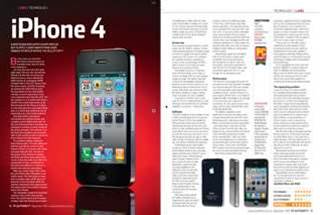
"We have been trying to find a solution to expand the capabilities of the iPhone by letting developers write applications for it, and yet keep the iPhone reliable and secure," Jobs told delegates.
Instead of allowing developers to install applications directly onto the phone, Apple has opted for the more controlled environment of the Safari browser.
"[The Safari engine] gives us tremendous capability, more than there has ever been in a mobile device. You can write amazing web 2.0 and Ajax applications that look exactly, and behave exactly, like applications on the iPhone," said Jobs.
Applications will still be able to use the phone's functionalities and place phone calls, said Jobs.
Working through the browser also allows developers to prepare applications today and have them available when the iPhone starts shipping on 29 June. No special sofware development kit is required.
The ability for developers to write software for the phone has been the subject of speculation ever since Apple first unveiled the device in January.
Because the iPhone runs a special version of Apple's OS X operating system, developers and potential users expressed interest in creating applications similar to the software that they can write for Mac computers today.
But although third-party applications are likely to increase the appeal of the device, they are also a potential liability if they crash the phone or degrade the user experience.
Using the browser as a controlled environment to deliver third-party applications is a tested method. Research in Motion, for example, uses a browser to isolate software from critical components of the phone on its enterprise email platform.
"They output the information into the browser engine," said Ken Dulaney, vice president for mobile and wireless with analyst firm Gartner.
"That eliminates the management problems that you might have otherwise."
Gerry Purdy, a principal analyst with Mobiletrax, has been briefed by Apple on the company's plans with the iPhone.
"They want developers to work through Apple rather than have a completely open platform over the first few quarters," Purdy told www.vnunet.com.
"Then they plan to expand the application development capability. It makes sense to them and the industry that they want to protect the user experience."
If Apple will ever allow third-party developers to create software directly on the device, the company is most likely to subject software to a certification programme. That allows Apple to control the quality of the software, suggested Purdy.




_(20).jpg&h=140&w=231&c=1&s=0)





 iTnews Benchmark Awards 2026
iTnews Benchmark Awards 2026
 iTnews Executive Retreat - Security Leaders Edition
iTnews Executive Retreat - Security Leaders Edition
 iTnews Cloud Covered Breakfast Summit
iTnews Cloud Covered Breakfast Summit
 The 2026 iAwards
The 2026 iAwards












_(1).jpg&h=140&w=231&c=1&s=0)



